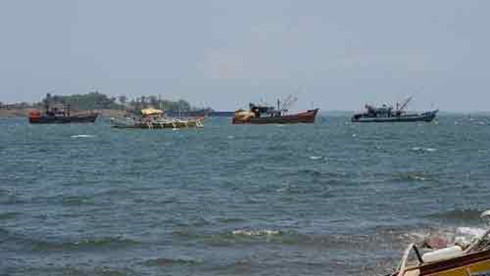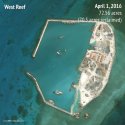You are using an out of date browser. It may not display this or other websites correctly.
You should upgrade or use an alternative browser.
You should upgrade or use an alternative browser.
South China Sea Strategies for other nations (Not China)
- Thread starter PanAsian
- Start date
That is probably the most significant Vietnamese reclamation effort I have seen.Vietnamese reclamation at West London Reef.
View attachment 27802
In March 2013, the area of West London Reef was 2.06 acres.
View attachment 27803
Three years later, in April 2016, Vietnam has reclaimed a significant 70.5 acres, increasing the reef size to 72.56 acres. It has an enclosed harbor.
70 acres is a significant undertaking.
Of course is pales in comparison to the Chinese efforts...but let's you know that Vietnam is doing what it can.
solarz
Brigadier
That is probably the most significant Vietnamese reclamation effort I have seen.
70 acres is a significant undertaking.
Of course is pales in comparison to the Chinese efforts...but let's you know that Vietnam is doing what it can.
It also means that it's pretty unlikely that China will be able to claim all the islands in the SCS. Chinese officials are no doubt aware of this, and since there has been no protest from China on this kind of work, it's pretty clear that China would be willing to accept a certain division of the disputed territory despite strong rhetoric.
Brumby
Major
Pentagon: 'Unsafe' intercept over South China Sea
At least two Chinese J-11 tactical aircraft carried out an "unsafe" intercept of a United States EP-3 reconnaissance aircraft that was conducting a routine mission in international airspace over the South China Sea, a U.S. defense official told CNN Wednesday.
The Chinese jets came within 50 feet of the U.S. aircraft at one point, the official said.
The incident took place on Tuesday.
Looks like a general sweep around Batanes - Vietnamese fishing boats were, unsurprisingly, detained as well.
The Philippines announced on May 17 that its patrol force had arrested three Vietnamese fishing vessels and two from China for illegal fishing in the country’s waters.

The three Vietnamese fishing boats, with 18 people on board, were seized in Calayan Island, Cagayan for poaching on May 12.
Meanwhile, the Chinese vessels carrying 25 fishermen aboard were caught sailing without permits between waters off Babuyan Island and Batanes province in the northern Philippines on May 16.
The boats, which were flying an inverted Philippine flag, were escorted to Basco port of Batanes province.
Meanwhile, Sumono Darwinto, chief of the local fishing office in Indonesia’s Pontianak, said on the same day that three Thai fishing boat captains had escaped from custody in Indonesia after their vessels were seized with dozens of trafficked foreign fishermen on board.
According to the Indonesian Fisheries Ministry, the 79 crew members from Cambodia and Myanmar were identified as victims of trafficking, and most had fake Thai travel documents.
joshuatree
Captain
Looks like a general sweep around Batanes - Vietnamese fishing boats were, unsurprisingly, detained as well.
Meanwhile, the Chinese vessels carrying 25 fishermen aboard were caught sailing without permits between waters off Babuyan Island and Batanes province in the northern Philippines on May 16.
But notice the Chinese vessels are not being charged for illegal fishing. They are merely caught for sailing without permits but this runs counter to UNCLOS Article 52, innocent passage in archipelagic waters. Are there designated sea lanes in the archipelagic waters around the Batanes area? Also, was there any advanced warning of suspending innocent passage in those archipelagic waters? If not, there is no need for permits for innocent passage.
The Brookings Institute's take on making minor compromises in the SCS to accommodate China: much more insightful than some other outfits that purport to be "think tanks".
Michael E. O'Hanlon | May 12, 2016 4:50pm

President-elect Rodrigo Duterte of the Philippines, known for his and supra-legal methods of reducing crime while mayor of Davao City on the island of Mindanao, is already causing consternation in many parts of the world. His previous tolerance for vigilantes as a crime-fighting tool, for example, is cause for concern.
But in other cases, we should relax and keep an open mind. For example, while editorial page has lamented that he appears willing to do a deal with Beijing—accepting Chinese investment in the Philippines while allowing China to enforce its claims to the uninhabited Scarborough Shoal in the South China Sea—that particular outcome may actually be good for the United States.
Provocateurs in Beijing
Let’s situate the Scarborough Shoal issue in broader context. In recent days, the United States , the William P. Lawrence, within 12 miles of the Fiery Cross Reef, a land formation in the Spratly Islands of the South China Sea that China has transformed into a 700-acre artificial island. China objected strenuously. Meanwhile, everyone awaits the ruling of an international arbitration panel, expected later this spring, on whether China or the Philippines (or neither) is the rightful claimant to the Scarborough Shoal.
To be sure, the broad problem starts in Beijing; The Washington Post is not wrong on that basic point. Incredulously, invoking fishing histories from many centuries ago, China claims not only most of the shoals and sand bars and small islands of the South China Sea, and not only the surrounding fisheries and seabed resources, but the water itself. Its so-called nine-dash line, which encompasses almost all of the South China Sea—including areas much closer to the Philippines and Indonesia and other key countries than to China’s own territory—can be interpreted as a claim to sovereign ownership. Fears that it will declare an associated air defense identification zone further complicate the picture.

Map of the South China Sea locating China's nine-dash line claim on the South China Sea, and the Air Defense Identification Zone (ADIZ). Note: The Spratleys, Parcels, and other islands in the South China Sea are disputed to various degrees by different parties. Photo credit: Reuters.
America’s aims are far less disruptive to the status quo. But of course, for America, the region is also much further away. In Chinese eyes, we already have our Caribbean Sea, and Gulf of Mexico—not to mention our extensive east and west seacoasts and other maritime domains. By contrast, China is largely hemmed in by land on three sides and Japan together with the U.S. Navy on the fourth. For Washington to deny China even a modest version of its own special waters strikes many in Beijing as haughty and hegemonic.
Choosing our historical analogies wisely
Of course, the United States is making no claims of its own in the region. Nor is Washington trying to dictate outcomes on all disputes. Washington does not take a position on who owns the land features of the South China Sea. Nor does it oppose any plan for joint exploitation of the area’s resources that regional states can agree on. Nor can the United States, or any other country, be expected to let China restrict naval and commercial shipping maneuvers through this region, through which at least one-third of the world’s commerce traverses. Nor should Washington abandon treaty allies—most notably in this case, the Philippines—if they come under fire from Chinese warships (as has happened before). And in fairness to Filipinos, the Scarborough Shoal is much closer to their country than to China, by a distance factor of more than three to one.
Yet there is a problem in Washington’s thinking, too. Given the way rising powers have behaved throughout history, it is unrealistic to think that China wouldn’t seek to translate its greater economic and military strength into some type of strategic benefit. Yet Washington expects China to stop building artificial islands, to abstain from deploying military assets to the region, and to accept adjudication of disputes over territory by an international panel.
... it is unrealistic to think that China wouldn’t seek to translate its greater economic and military strength into some type of strategic benefit.
Many Americans would view any bending of the rules in Beijing’s favor as appeasement and thus an invitation to further imperialistic behavior by China. We have learned the lessons of World War II and the Cold War very well.
But it is also important to bear in mind the lessons of World War I, when great powers competed over relatively minor issues and wound up in a terrible conflict. Just as Germany had been largely shut out of the colonialism competition prior to 1914, making its leaders anxious to right what they saw as historical wrongs in advancing their own interests once they had the capacity, it is possible that China will refuse to accept the status quo going forward. By this alternative reading of history, our job should be to persuade China to be content with very minor adjustments to the existing global order—and to remind Chinese that they have benefited greatly from that order—rather than to oppose each and every small act of Chinese assertiveness as if it portended the first of many dominoes to fall. The good news in this case is that China is not challenging existing state borders, threatening established population centers, or using lethal force as a default instrument of state power. Its behavior is worrying, to be sure—but not particularly surprising, and by the standards of history, relatively benign to date.
Walk the line
With this perspective in mind, the United States should continue to insist on freedom of navigation in the South China Sea, and sail its ships wherever it wants, including within 12 miles of reclaimed islands. It should punish China for any future, limited use of military violence against a country like the Philippines by shoring up alliances, increasing forward U.S. military deployments, and imposing economic sanctions in concert with allies. But it should not itself use lethal force to directly respond to most small possible Chinese provocations or to evict People’s Liberation Army forces from disputed islands and shoals. It should tolerate some modest degree of expanded Chinese military presence in the area. And it should encourage regional friends to accept deals on joint economic exploitation of the region’s resources in which China would in effect be first among equals—though of course the exact meaning of that phrase would require careful delineation.
Its behavior is worrying, to be sure—but not particularly surprising, and by the standards of history, relatively benign to date.
Duterte’s willingness to do a deal with China would seem to fit with these criteria, without surrounding any substantial claims to Beijing, and without suggesting any weakening in its ties to the United States either. The Philippines shouldn’t concede meaningful economic resources in the waters and seabeds surrounding the Scarborough Shoal. But ownership and control of the land features themselves are a minor matter about which Manila might well usefully compromise.
The United States and China are likely to be jostling for position in the South China Sea for years. That is probably inevitable. It is also tolerable, if we keep our cool while also maintaining our resolve—and if we patiently look for an ultimate compromise on the issues that currently divide America and its regional friends from Beijing. Ironically, the strongman from Mindanao may help us along with this process.
bluewater2012
Junior Member
As I understand it, Philippines used to have a long tradition of caste system under Spanish rule. Some of the early Chinese traders evolved into a mixed blood category that later formed the ruling elite, during American colonization and after independence. There was a long line of mixed Chinese mestizo presidents in Philippines, and Aquino is one of them I believe. They are usually pro-colonialist.
Duterte is native, what Spanish would call indio. They are anti-colonialist, ie anti-American.
That's correct except Duterte also has Chinese blood. Before winning the Presidential election there was talks he has 1/4 Chinese blood. Then I searched online today after reading your post and found this the closet mentioning on the subject.
"When asked how he would handle the country’s territorial dispute with China, Duterte said he would rather talk things over with the Chinese.
“While we must never surrender our sovereignty on the West Philippine Sea islands, we must face the reality that a non-confrontational approach would be the best option. There is a bit of Chinese blood in almost all of us Filipinos and I believe the Chinese are a reasonable people,” he has said.
source:
22 things to know about 'Duterte Harry'






